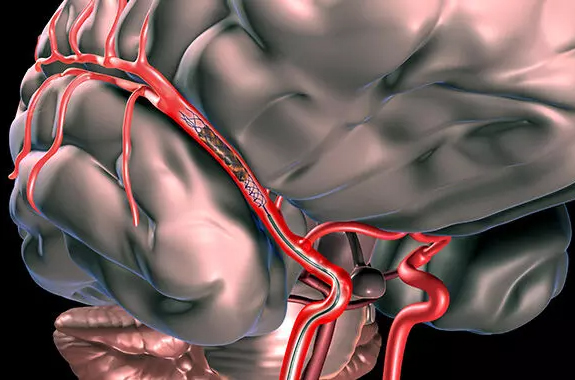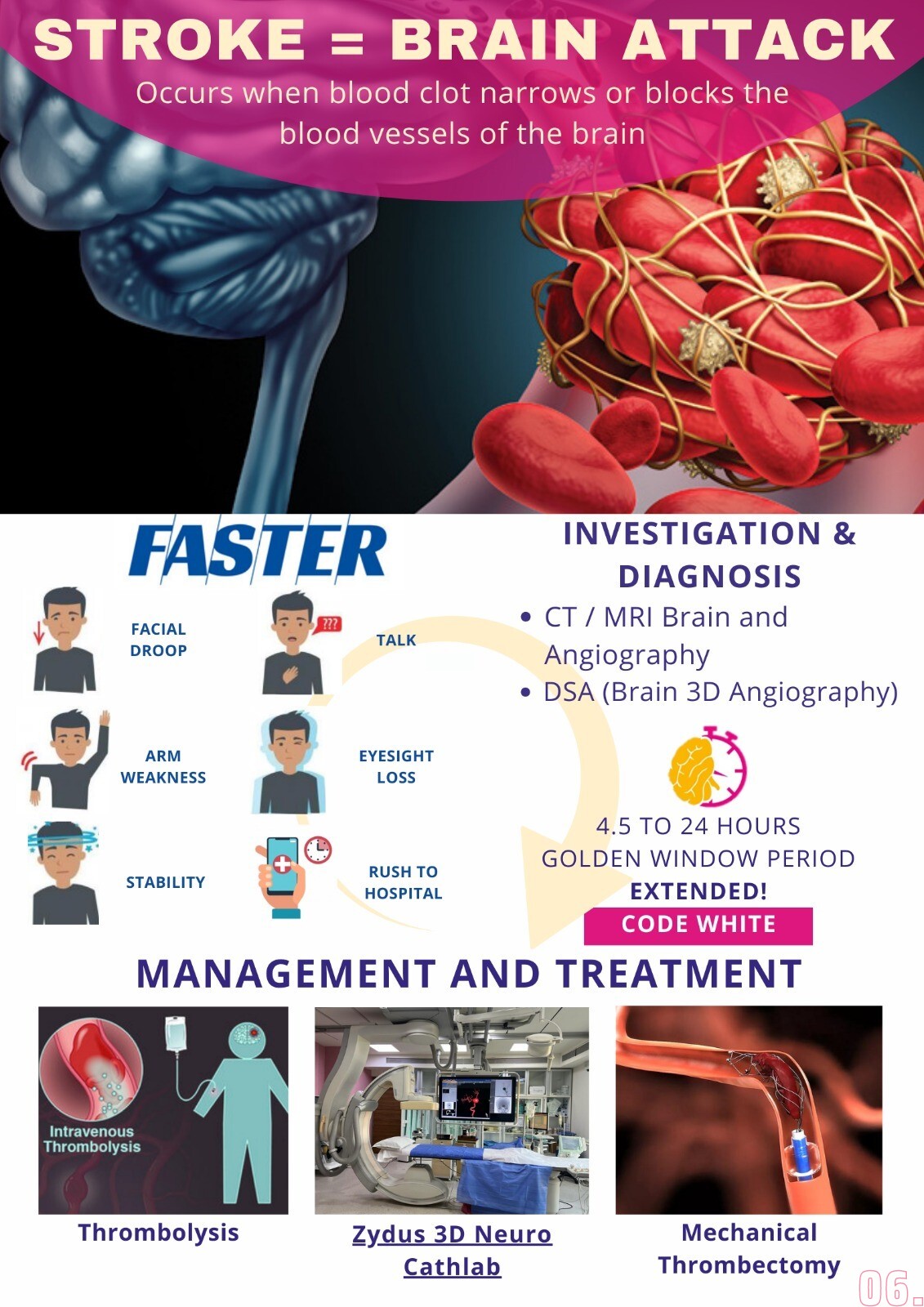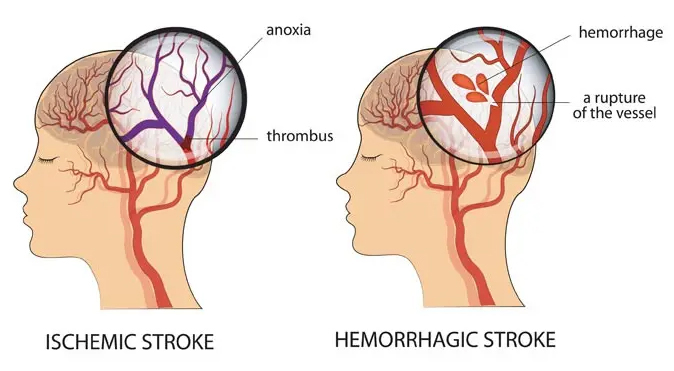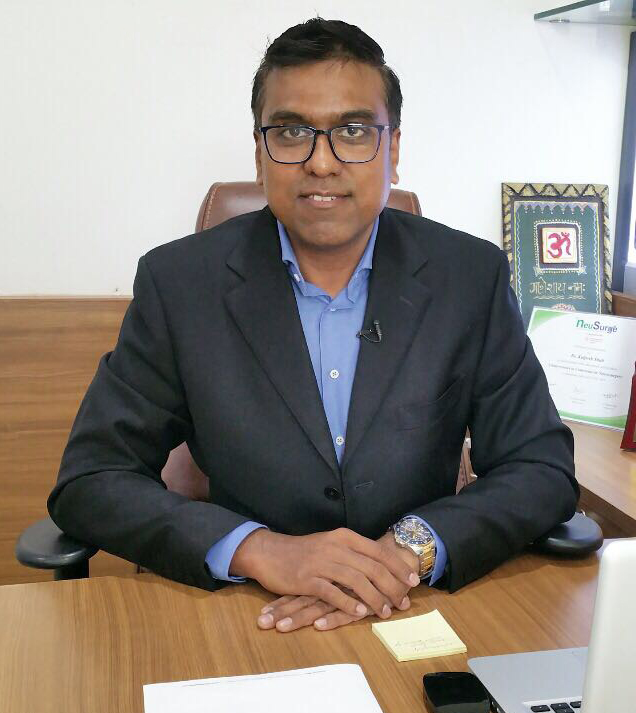Stroke Symptoms & Treatment
Stroke Treatment: Regain Control and Quality of Life
Welcome to the website of Dr. Kalpesh Shah, Senior Consultant Neurosurgeon & Neurointerventionist, dedicated to providing comprehensive stroke treatments. If you or your loved one has experienced a stroke, you can trust Dr. Shah’s expertise and compassionate care to help you navigate through this challenging time.
Understanding Stroke: A Devastating Event
A stroke is a life-altering event that occurs when blood flow to the brain is interrupted or reduced, leading to the deprivation of oxygen and vital nutrients. It is a medical emergency that requires immediate attention, as every minute is crucial to minimize potential brain damage and increase the chances of a successful recovery.
Our Approach:
We recognize the critical importance of time when it comes to stroke treatment. Our stroke operating services follow a multidisciplinary approach, ensuring prompt and accurate diagnosis, immediate intervention, and comprehensive postoperative care. We understand that every stroke case is unique, and we tailor our treatment plans to meet the individual needs of each patient, considering their specific symptoms, medical history, and overall health.

Dr. Kalpesh Shah’s Expertise and Dedication
Dr. Kalpesh Shah is a highly accomplished neurosurgeon and neurointerventionist with years of experience in treating stroke patients. His expertise extends to both surgical and non-surgical interventions, allowing him to provide comprehensive stroke care. Dr. Shah is renowned for his commitment to delivering personalized treatment plans that address the unique needs and conditions of each patient.
Comprehensive Stroke Treatments
Dr. Shah has been practicing a range of stroke treatments designed to provide the best possible outcomes for his patients. These services include:
- Emergency Stroke Care: As a stroke is a medical emergency, Dr. Shah and his team are available 24/7 to provide immediate care to patients experiencing stroke symptoms. They ensure a rapid response and quick assessment, facilitating timely interventions to restore blood flow to the brain.
- Minimally Invasive Neurointerventional Procedures: Dr. Shah specializes in advanced neurointerventional procedures to treat strokes. Using state-of-the-art technology, he performs minimally invasive procedures such as endovascular clot removal, aneurysm coiling, and carotid artery stenting. These techniques aim to restore blood flow and prevent further damage to the brain.
- Complex Brain and Vascular Surgeries: In cases where surgical intervention is required, Dr. Shah has extensive experience in performing complex brain and vascular surgeries. From removing blood clots to repairing damaged blood vessels, his surgical expertise ensures the highest level of care for stroke patients.
- Acute Stroke Intervention: Dr. Kalpesh Shah specializes in acute stroke intervention, utilizing advanced neurointerventional techniques such as mechanical thrombectomy. This minimally invasive procedure involves removing blood clots from blocked arteries in the brain, restoring blood flow and preventing further damage.
- Cerebrovascular Bypass Surgery: In cases where blood flow to the brain is severely compromised, Dr. Shah performs cerebrovascular bypass surgery. This procedure involves creating alternative pathways for blood to reach the affected areas of the brain, reducing the risk of stroke and improving overall blood circulation.
- Carotid Endarterectomy: Carotid endarterectomy is a surgical procedure aimed at removing plaque buildup from the carotid arteries, which are responsible for supplying blood to the brain. Dr. Shah performs this procedure with precision, reducing the risk of future strokes and promoting better cerebrovascular health.
- Telestroke Services: Our facility offers telestroke services, enabling remote consultations and expert guidance for stroke patients who may not have immediate access to specialized care. Through secure video conferencing and telemedicine technologies, Dr. Shah can assess patients, provide recommendations, and coordinate with local healthcare professionals to ensure timely intervention.
Compassionate Care and Support
Dr. Shah and his team prioritize the emotional well-being of their patients and their families. They understand that stroke not only affects physical health but also has a significant impact on mental and emotional well-being. With compassion and empathy, they offer guidance, education, and support to help patients and their families navigate the recovery process with confidence and resilience.
- Expertise: Dr. Kalpesh Shah's vast experience and specialized training in neurosurgery and neurointervention ensure the highest standard of care for stroke patients.
- State-of-the-Art Facilities: Our facility is equipped with cutting-edge diagnostic and surgical technologies, enabling accurate diagnosis and advanced treatment options.
- Comprehensive Care: Our stroke operating services encompass the entire spectrum of stroke care, from emergency intervention to follow-up rehabilitation, providing a seamless and holistic experience for our patients.
- Multidisciplinary Approach: Dr. Shah understands the importance of a multidisciplinary approach in stroke care. He works closely with a team of specialists, including neurologists, radiologists, rehabilitation therapists, and nurses, to provide comprehensive and holistic care throughout the patient's journey.
- Patient-Centric Care: At our clinic, patient well-being and satisfaction are our top priorities. We prioritize open communication, empathy, and personalized care to ensure a positive experience throughout the treatment journey.
Distinctive Types of Strokes and Their Symptoms
Haemorrhagic Stroke:
- Abrupt and intense headache localized in the frontal and occipital regions
- Stiffness in the neck
- Episodes of convulsions or seizures
- Sudden and complete paralysis of specific body parts
- Rapid escalation in blood pressure levels
Ischemic Stroke:
- Immediate onset of paralysis on one side of the body
- Sudden disruption in speech, such as slurred speech or difficulty forming words
- Experiencing vertigo, dizziness, vomiting, or imbalance without warning
- Unexpected surge in blood pressure
The Diagnosis and Treatment of Stroke
A. Diagnosing Stroke:
Please note that these symptoms should be taken seriously, and if you suspect someone is experiencing a stroke, it is crucial to seek immediate medical attention.
- Computed Tomography (CT) Scan and Angiography: This imaging technique utilizes X-rays to create detailed cross-sectional images of the brain. In combination with angiography, which involves injecting a contrast dye into the blood vessels, CT scans can help identify any blockages or abnormalities in the blood vessels supplying the brain.
- Digital Subtraction Angiography (DSA): DSA is a specialized form of X-ray imaging that provides a highly detailed visualization of the blood vessels in the brain. By subtracting images taken before and after the contrast dye is injected, DSA can precisely locate and evaluate any blockages or abnormalities.
- Magnetic Resonance Imaging (MRI) Scan of the Brain and Angiography: MRI scans use powerful magnets and radio waves to produce detailed images of the brain. When combined with angiography, this technique can provide a comprehensive assessment of the brain's blood vessels, allowing for the identification of potential issues such as clots or aneurysms.
B. Treatment Options for Stroke:
- Time Is Brain - The Importance of Early Treatment: In the case of acute stroke, time is of the essence. The first few hours following the onset of stroke symptoms are often referred to as the "golden hour." During this critical period, prompt medical intervention can greatly reduce the extent of brain damage and improve the chances of recovery.
- Thrombolytic Drugs: Thrombolytic drugs, also known as clot-busting medications, are commonly used within the first three hours after stroke symptoms begin. These drugs work by dissolving blood clots that may be blocking blood flow to the brain. However, it's important to note that the use of thrombolytic drugs beyond the recommended time frame can increase the risk of dangerous bleeding complications.
- Mechanical Thrombectomy: In cases where thrombolytic drugs are not a viable option or when the clot remains despite medication, mechanical thrombectomy may be considered. This procedure involves the insertion of a tube-like device into a major blood vessel, allowing the physician to physically remove the clot. Mechanical thrombectomy is most effective when performed within 24 hours after the onset of stroke symptoms. By employing techniques such as stent placement and aspiration catheters, this minimally invasive procedure can restore blood flow to the affected area.
- Decompression Craniectomy:: Decompression craniectomy is a surgical procedure used to relieve pressure on the brain caused by severe traumatic brain injury or stroke. It involves removing a portion of the skull to alleviate brain swelling or bleeding. This procedure can be a life-saving intervention in cases where the increased pressure poses a significant risk to the patient's well-being. Although decompression craniectomy carries potential risks and complications, it may be the only viable option to prevent further damage to the brain in certain cases of ischemic or haemorrhagic strokes.It's worth noting that stroke treatment options may vary depending on the type of stroke, its severity, and individual patient factors. Therefore, it is essential for stroke patients to receive a prompt and accurate diagnosis from a healthcare professional to determine the most appropriate course of action.
Consult Dr. Kalpesh Shah for Stroke Treatments
If you or your loved one has experienced a stroke, don’t hesitate to reach out to Dr. Kalpesh Shah and his team. They are committed to providing exceptional stroke operating services that prioritize your well-being and help you regain control and quality of life. Contact us today to schedule a consultation or to learn more about our services.


